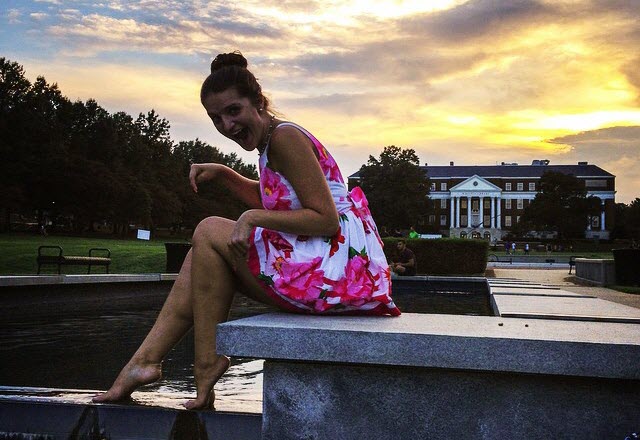Where Are They Now: Paige Goodwin
Paige Goodwin wholeheartedly believes that through the power of her offerings to the statue of Testudo the Terrapin on McKeldin Mall at the University of Maryland, all passing grades are possible.
January 21, 2015
Paige Goodwin is the former co-editor of AACC’s literary magazine, Amaranth. Now 21 years old, she is currently studying English at the University of Maryland while minoring in Creative Writing with a concentration in poetry.
Q: When did you attend AACC/when did you graduate?
A: Fall 2011-Fall 2013
Q: What did you learn from your experience in the clubs?
A: Building connections and friendships with people outside of your classes is super vital to feeling a sense of community at your school. I couldn’t figure out what I was missing my first semester at AACC, and then I joined a club, and everything just clicked. I met some of my best friends through the clubs here and made some of the most rewarding faculty connections as well.
Q: What was the hardest thing you had to deal with while you were the co-editor of
Amaranth?
A: Definitely having to set realistic limits. We had a huge staff and everyone was super ambitious and brought all these great ideas to the table, but logistically, we couldn’t do everything. And we couldn’t publish absolutely everyone who submitted, either. Luckily, we got to accomplish a lot of what we wanted to because everyone worked so hard together, but we still had to limit ourselves and that was really hard.
Q: How did it prepare you for attending the University of Maryland?
A: It helped get me a spot on the editorial boards at Maryland, but it also has helped [me] score my dream internship and helped me get into the English Honors Program. Not only did I gain these great skills like editing and managing a staff, but it also is something tangible that I can point to and say “Hey look, not only do I like writing, but this is what I did on Amaranth and I can bring those skills to the table here,” which is really helpful because I’m slowly learning that the job market and internships really require you to sell yourself.
Q: Are you a part of any clubs, etc., at school right now?
A: I am a staff member on the Poetry board of Stylus, which is Maryland’s equivalent of Amaranth, and I’m a staff member on Paper Shell Review, which takes worldwide submissions for critical essays on literature.
Q: What’s the biggest difference between your university and AACC?
A: Other than just the size of the university and the student body, the professors are really different. Most of them only teach one or two classes and then spend a lot of time doing research which sometimes makes them less accessible, but then they also have really neat things to talk about during their office hours. One of my professors was in London three days a week working on a project one semester. I’ve also had a grad student teach a class, and in the honors program professors just get to invent a class and teach whatever they feel like, so we get to learn from someone who’s as enthusiastic as they get.
Q: Did any one professor motivate you in your time here with us at AACC?
A: Everyone was wonderful in the English department, but Professor Brown really impacted me. Not only did he ask me to be the co-editor of Amaranth and gave me a really amazing opportunity, he also worked with me on my creative writing portfolio and gave me a confidence in my writing I never had. In workshops, if people didn’t like something, I would re-write it without a second thought, but Professor Brown taught me that it’s okay to stick by what I write (so long as I have good reason), and to not just please other people with my writing.
Q: Where are you working, right now?
A: I currently am an Apprentice Teaching Artist with Young Playwrights Theater, which means I help a playwright teach underprivileged kids in DC how to write plays. This past semester, I got to teach third graders once a week, and it was the most rewarding experience I’ve ever had.
Q: Top 5 favorite authors?
A: Since I’m on a play-reading binge, here are my top five playwrights: Oscar Wilde, Sam Shepard, Suzan-Lori Parks, John Patrick Shanley, and Tennessee Williams.
Q: Top 5 favorite artists?
A: Probably God for all five because he created George Clooney and he’s the greatest piece of artwork ever made.
Q: What’s the most interesting thing that’s ever happened to you?
A: I got to talk to Stephen Colbert at a taping of The Colbert Report (RIP to the greatest show of our generation) about his writing and sometimes I’m kind of convinced I dreamt it because it was so surreal and he high-fived me and I showered with that hand in a Ziploc bag for like two weeks.












